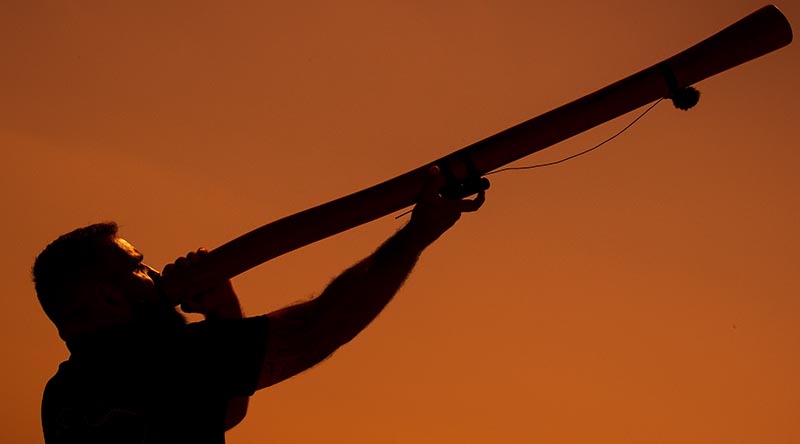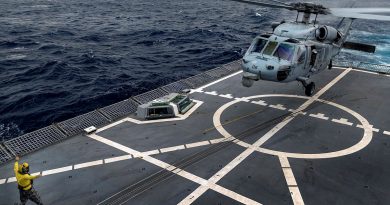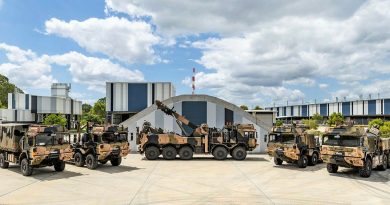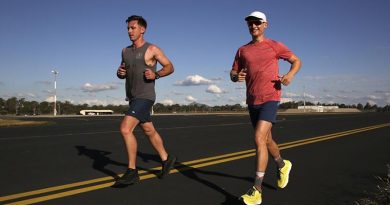Defence’s calling to Indigenous affairs

National Reconciliation Week is a chance for Defence to reflect on the contribution First Nations personnel have made, and continue to make, to defence capability through their unique skillsets, knowledge and perspectives.
FILE PHOTO: Navy Regional Indigenous Development Coordinator Leading Seaman Joseph Canning plays the didgeridoo at ANZAC Cove during an ANZAC Day rehearsal on the Gallipoli peninsula in Türkiye. Story by Deb Hartlett. Photo by Corporal Madhur Chitnis.
A variety of programs, policies and pathways are in place to ensure First Nations people play an increasingly important part across the board in the Australian Defence Force.
The Indigenous Cultural Advisory Group (ICAG) is key in informing Defence’s First Nations strategies, policies and programs to ensure First Nations’ voices are heard.
ICAG Chair and Defence’s Assistant Secretary Workplace Health and Safety John Love said the group provided senior leaders and Defence groups and services with strategic cultural advice and guidance.
“This ensures policies, strategies, projects and programs are appropriately developed, targeted and culturally appropriate while still remaining focused on defence capability,” Mr Love said.
The Royal Australian Navy, Australian Army and Royal Australian Air Force have elders who guide their services with cultural and strategic advice, mentoring and support.
Elders strengthen cultural knowledge and build links with First Nations communities.
One of Navy’s elders, Uncle Phillip Bowie, sees himself as a mentor and provides support to younger recruits and sailors.
“I would like them to think of me as someone they can talk to if they find themselves in a difficult position or just need advice,” Uncle Phillip said.
Army and RAAF also have Indigenous Liaison Officer Networks across Australia, strengthening the services’ cultural understanding and advising commanders on creating or improving local relationships with First Nations communities.
Navy has Regional Indigenous Development Coordinators, who help naval commands to understand issues facing First Nations sailors and communities.
They play a key role when the ADF is deployed to remote communities.
RAAF Indigenous Liaison Officer Flight Lieutenant Tramaine Dukes is a Mara woman from the Northern Territory who was born in the Pilbara and grew up in Perth.
Flight Lieutenant Dukes describes her role as linking Aboriginal communities with Defence members, “to build relationships and break down barriers, making sure we can all work together – vital in times of crisis”.
On the employment side, one of the ADF’s primary contributions to the National Agreement on Closing the Gap is through targeted First Nations employment and procurement pathways.
First Nations peoples can apply to join Defence via direct entry, or via a range of ADF First Nations employment pathways.
Specialist Indigenous recruiting teams provide prospective candidates with the information they need about enlistment.
There are a number of options, including the tri-service Indigenous Pre-Recruitment Program, Navy’s and Army’s Indigenous Development Programs and RAAF’s Flexible Employment Pathways.
Uncle Phillip provides support to the Navy program.
“I can spin a good yarn about my time that may help the young recruits,” he said.
Defence’s First Nations personnel don’t all wear uniform.
Apart from direct-entry recruitment options, Defence also has a range of First Nations Australian Public Service (Defence civilian) employment pathways.
These include targeted cadetships, traineeships, graduate placements and specific legislative ‘affirmative-measure’ recruitment.
A recent Indigenous Graduate Pathway graduate Peter Vonhof said the program allowed him to pursue his interest in military aviation and work on a RAAF base.
Mr Vonhof is based at RAAF Base Wagga as a base services officer and described some of the cultural immersive experiences as a highlight, including spending time with local First Nations peoples around Sydney Harbour while based at RAAF Base Richmond during one of his rotations.
The ADF provides community assistance to remote First Nations communities through Army’s Aboriginal Community Assistance Program (AACAP), which is a housing, infrastructure and essential-services program – and RAAF’s Exercise Kummundoo, a health (predominantly dental) program delivered to remote communities.
Defence also provides more First Nations Australians with business opportunities under the Indigenous Procurement Policy.
The recent procurement of services provided by First Nations and veteran-owned organisation Unearth Risk, to help develop Defence’s next First Nations Approach, is an example of this.
Defence was again awarded Supply Nation’s Government Member of the Year Award in 2022 in recognition of our First Nations procurement efforts.
Learn more about Defence’s First Nations strategies, policies, projects, programs and employment pathways on the Defence website.
.
.

.
.





